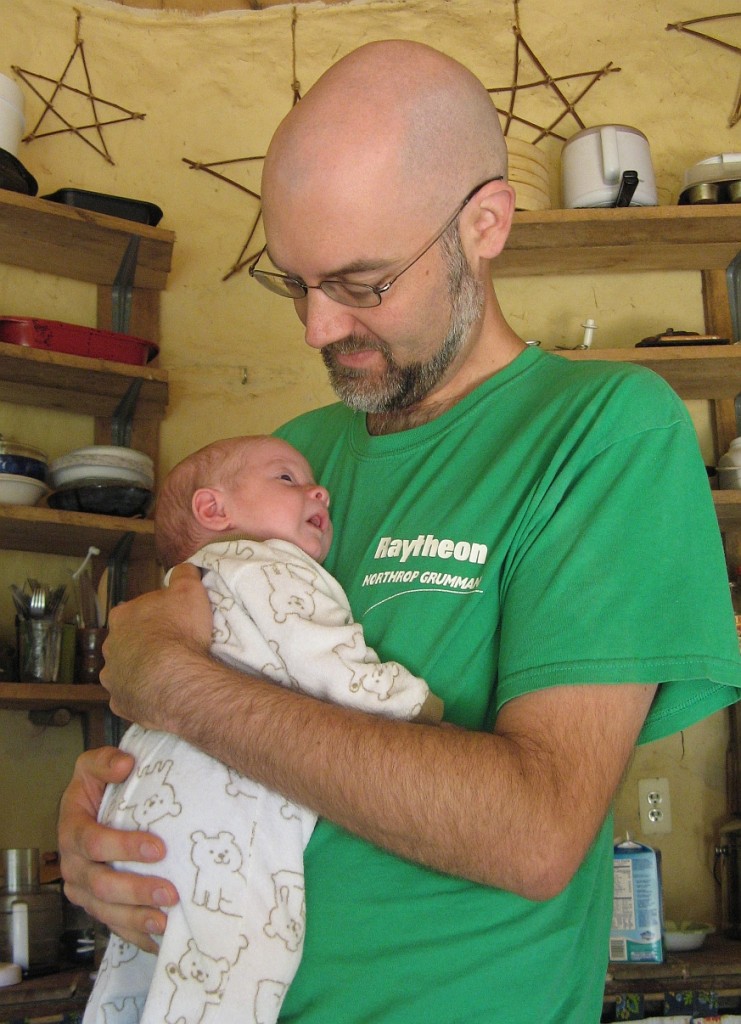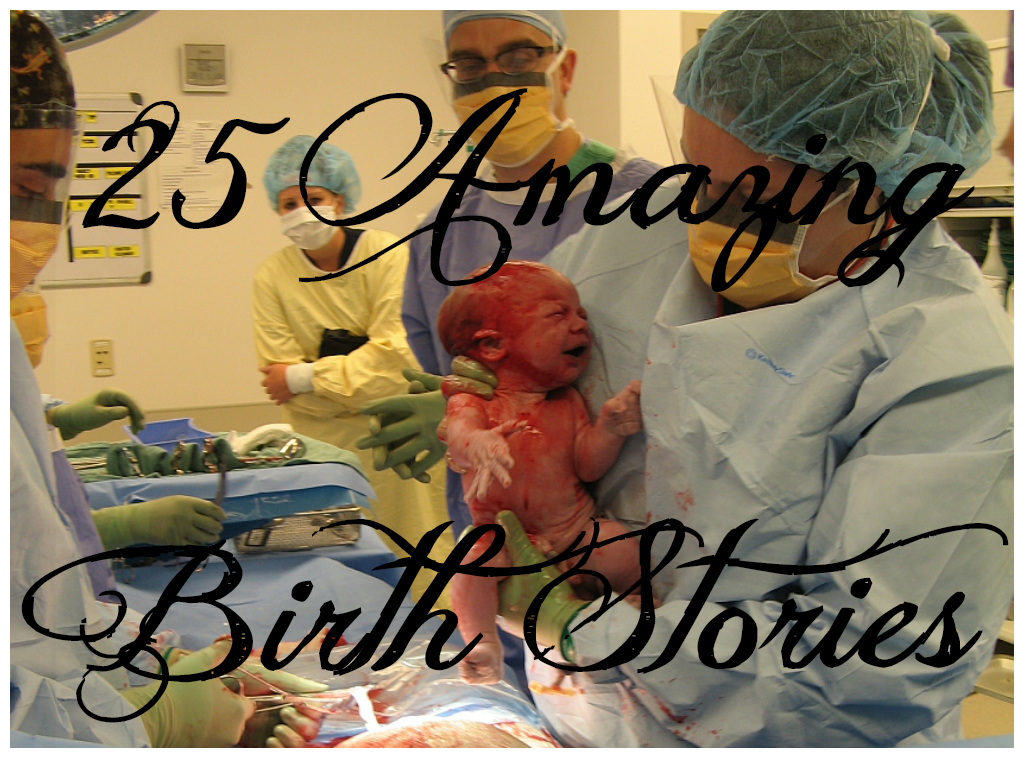
I’m sure there’s a poignant and telling metaphor out there that could convey just how very uniquely awful having a C-section is, but I can’t think of one. Maybe it’s not really like anything. Maybe it just sucks.
I asked everyone at the hospital how long it would take to feel better. The answers varied, from “You’ll be up walking around, feeling so much better in a couple of days!” to “You’ll be 90% in about a month.” A couple of days. I could do that. A month? Not as good, but I could still do that.
Well, a couple of days went by and I could barely move. Although I still had Heron’s meconium and blood on me, I was physically incapable of showering. I felt so helpless, especially because the nurses seemed so impatient, too busy to help. I was discharged without knowing whether or not I could climb stairs and get into my own house.
At home I found that yes, I could go up the stairs. It was not easy; everything hurt. At some point during that first week, I wailed to my husband “I’m recovering from major surgery and giving birth on Motrin! This is evil!” The pain just didn’t end. It was like I was still in labor.
My midwife had set up an appointment for me with another practice closer to my house for my week check-up. Here’s part of my conversation with this midwife, whom I had never met before.
Midwife: … and when you’re done with your narcotics…
Me: Wait, I’m on narcotics?
Midwife: Aren’t you? Didn’t they give you a prescription for lortab?
Me: Uh, no. I’m taking Ibuprofen.
Midwife: You’re not taking pain medication and you just walked right in here a week after a C-section? And labor? You’re a rock star!
Me: No wonder why I feel so shitty. (And I start crying, of course.)
So, if somehow you end up discharged without a prescription after your C-section, know that your doctors are not sadistic, they just made a mistake. Go ahead and make them fix that pronto. Then go brush your hair, because your rock star status will be downgraded.
Being “allowed” narcotics wasn’t the only surprise in store for me during that appointment. The hospital had sent over the paperwork about Heron’s birth, and the midwife sat down to share it with me. Finally! Despite my questions after the C-section, nobody at the hospital had time to sit down and talk with me about what happened. I had to wait to talk to someone I had never met before I could find out the specifics.
Because of my back labor, I believed that Heron had been posterior, or sunny-side-up, with his backbone pressed against my backbone. Perhaps he wasn’t fitting that way, because at some point he must have tried to turn—but he didn’t make it all of the way. Instead, he ended up transverse, with his head sideways (note: this is different than a transverse lie). According to documentation from the hospital, they found him in “deep transverse arrest” when they pulled him out of me during the C-section. There was no way that Heron was going to fit with the widest part of his head presenting. (Note: If you’re not sure what I mean, here is a good link to check out.)
Despite the logic of that last statement, I had and still have a lot of grief over the C-section. Often, after I nurse Heron at 1 or 2 a.m. and put him back to sleep, I have trouble putting myself back to sleep. Different details of my birth experience surface nightly, but my strongest emotions keep coming back to one thing– a sense of loss over not getting to feel Heron come into this world. During labor, I felt so much—but I didn’t get to feel him being born. Because Heron may be our only child, I likely will never get to experience that. These feelings, like labor itself, are something I can’t shut off, but can only work with.
This is where people tell me, “But you should be grateful a C-section was available. If you lived 200 years ago, you’d be dead. After all, you have a healthy baby, and that’s all that matters.”
I believe that this is what the medical profession wants us to believe—but I don’t think it’s the whole story. A healthy baby, a healthy mama, and a normal, whole birth: one doesn’t necessarily preclude the other. Yet we’re made to feel guilty for wanting to “have our cake and eat it too,” as if what’s best for mama, what she wants, couldn’t also be what’s best for baby, too. I very much love my healthy baby and am grateful for him—but I do regret not being able to birth him, and I’m not ashamed of those feelings. (In fact, I think it’s normal and maybe even evolutionary hardwired for a laboring women to want to be aware and feeling as her child leaves her.)
Yes, thank God for C-sections that are most often safe and effective. Some women need them, and would no longer be here without one. But did I need one? Maybe. I’ll never really know, because nobody tried to turn my baby. I thought that this option wasn’t provided by most doctors at this hospital because it was either risky or had only a slim chance of working—but now, after having done some research, I find that it isn’t the case. (Take a look at this article from Science & Sensibility.) Could my baby have been one of the 90% of babies that it would have worked for? Very likely, but it only remains a what-if. Because there was nobody available to me that had the ability to perform the rotation (though plenty that could do a far more complicated C-section!), yes, I did have to have a C-section in this specific situation. I don’t fault any person involved, knowing that everybody did what they could to help me avoid a C-section, but if the medical system had different priorities, and different skill sets were taught, then perhaps I would be telling a different story now.
If you are searching for a midwife or doctor, my advice is that you ask them about their experience with posterior labor and turning babies during labor. Do not settle for the answer “most babies will wiggle their way to a good position during labor.” This might be true, but it doesn’t really address the problem. I never thought to ask too much about this, because the stories I have heard and read with back labor involve the woman just dealing with it. (This midwife, though, believes otherwise.) I just thought that’s what you did, and your own bad luck if you happen to have a sunny-side-up baby. I didn’t realize that my baby could end up in deep transverse arrest, and I could have a C-section because that’s all that was available to me.

Other Reflections:
On Being Persuaded to Have a Cesarean: This is probably where I have the most anger regarding my hospital stay. Instead of informing me of my specific situation and treating me like an intelligent person, I was given a speech/lecture that I bet this doctor hardly ever varied. I really should get a C-section because the baby might become in distress after such a long labor (umm, no. The baby was being continuously monitored and his heart rate didn’t drop even once the whole time.) We don’t know why the baby isn’t coming down, but it’s dangerous to keep trying because his cord could be too short (umm, no. The heart rate never dropped.) And this one was a little unique: It’s not good for your baby to be in your vagina for so long. He could get an infection. (never mentioning the chances of my getting an infection during a C-section, of course. But, keeping in mind mama’s health doesn’t matter, still no. Heron still had his amniotic sac protecting him.)
Meanwhile, if I had known Heron was transverse, I would have asked for a C-section pronto! I didn’t want Demerol, Pitocin, and an epidural to be in me, transferring to Heron, if it wasn’t going to do anything! I only did all those things because I thought they could potentially work! It was a good thing I didn’t believe what this doctor had to say, because I would have been really confused about what did end up happening. It took four hours after I agreed for them to start the C-section! A real “dangerous” emergency, wouldn’t you say? It was pretty scary for me to know that at least some of the things she said were misleading. As a result, I felt like I couldn’t trust anything this doctor said.
About pain medication:
I wanted to have a natural labor and a natural birth. Before I had Heron, I thought that pain medication was like a C-section in that it was a “Thank God we have it” last resort that just didn’t apply to me. However, I should have realized that it wasn’t about me. It was about the situation, and no amount of desire could have changed it. When I thought about what-ifs, I never believed in them. “What if I need pain medication or a C-section” was like “What if I had to pack a suitcase for a trip to the moon.” Sure, there are people out there who need to think about these things, but it wasn’t real for me.
Even if you can’t make it feel real to you, it’s a game we can all play to at least prepare ourselves somewhat: What if you’re an expectant mother? What if x happens and you need or want a C-section or pain medication? What if it’s real?
For example, if you need a C-section, they are not (thankfully) going to perform that operation on your unmedicated self. It’s important to get to a place where this is okay, and you’re not going to feel guilty unnecessarily. What if you’re in labor for 24, 36, 48 hours, and think an epidural might help you relax or rest enough to birth your baby vaginally? That answer will be different for everyone, but one thing I do believe is that women have the right to (at least try for) a non-traumatic birth.
I know a woman who thinks about her non-medicated, natural birth in the way that many women think about their overly-medicated, hospital-controlled births. She had committed to not having any pain medication, and stuck with it, even though she got to a place where not only was she not on top of her pain, but she didn’t even want to be on top of it anymore. Her son was born with her feeling this way. For her second birth, she labored naturally until she started feeling this way, asked for an epidural, and actually was able to be mentally present during her second child’s birth. This birth was healing for her. Everyone has a different story to tell, and one thing I learned is that you don’t know what yours will be.
That being said, however, I do know that many women ask for pain medication because they are afraid that they won’t be able to handle the pain that is coming, not because the actual pain is too much for them. My advice is to prepare for the pain as much as you can by learning about labor, practicing different pain-coping techniques, and reading birth stories. Be willing to do what is right for you, and practice advocating for yourself before the birth. When you’re in labor, just deal with the moment that is happening right then– don’t think about the pain still to come. Even if you do all of that, you may still need to make different choices about pain medication than I did, because we are different people, and please believe me– really believe me– when I say that it is OK!

This little boy already knows how to advocate for himself.
For me, I had a very painful labor, but the hormones that were released during that time allowed me to bond with Heron right away. I am so glad I was able to have a natural labor, even as I regret having an unnatural birth.
On recovery:
So you’ve just had a C-section, and when you read “You’ll be 90% in about a month,” you started to cry? Well, you can stop now. I assure you, they’ve all been lying to you. People who actually go through an unplanned C-section have since told me three months, a year, and it can vary depending on who you are. Also, those nurses that told you not to be lazy, and get out of bed or you won’t heal? Erase that from your memory. Unless you’re rich and/or famous, it’s probably not possible to do too little and still feed yourself, take care of your baby, and have a clear path from room to room in your house.
It’s been a month, and I’m not even close to 90%. Yesterday I walked maybe a mile on a flat surface, over a span of a few hours, with lots of rest. Today I can barely get out of bed. This is not 90% of my pre-pregnant or pregnant self. I can’t believe that after a month I am still wishing I could feel as good as I did when I was 9 months pregnant. I know that eventually I will feel better, and I am healing, but it is very, very slow.
About What’s Important:
The whole story—good and bad, the grief and the joy—is important. The details that keep coming back to me even after I write this– how I almost bit my midwife when I was in so much pain (I was biting my own wrist, and hers was right next to mine!), how I sat on Eric’s lap and hugged him, how I gagged on the Hi-C when I tried to drink it– it’s all important. It’s important because this birth was the first thing we did together as a family. It’s important because the whole time, through every terrible and wonderful thing, we loved each other. I never, ever stopped feeling the love.
It’s an experience I would never want to forget.

We love you, Heron.















